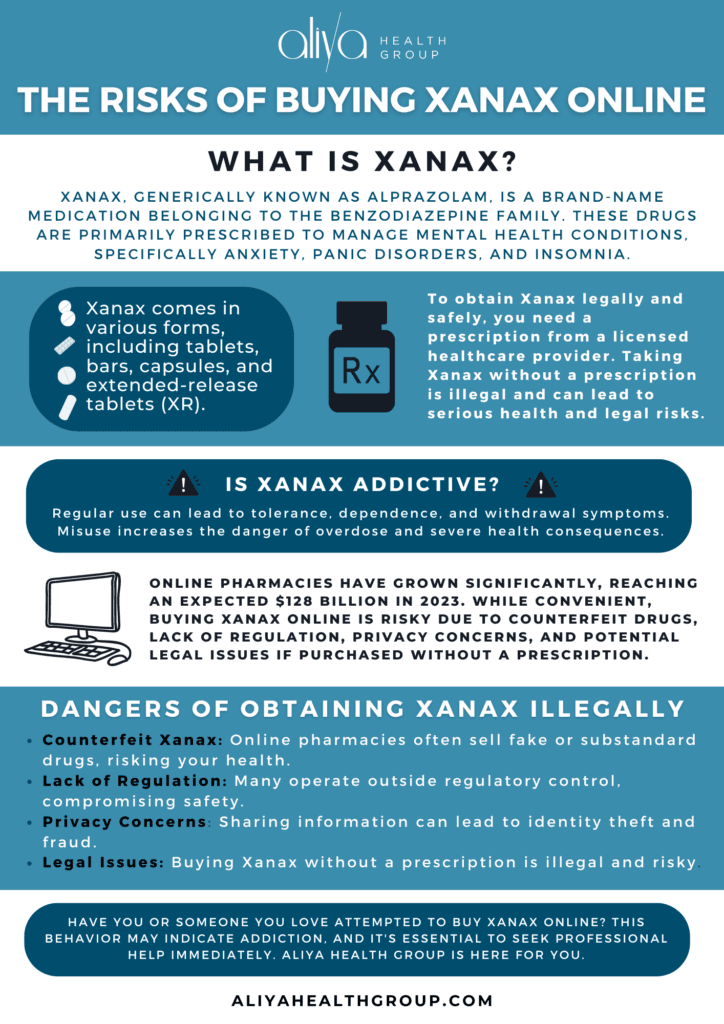For many individuals, the constant hustle and bustle of life can be overwhelming, leading them to seek relief. This is where Xanax (Alprazolam), a prescription medication, often enters the picture. But what exactly is Xanax, and how does it work? Is it safe, and is it addictive? How do people generally get their hands on the drug?
What Is Xanax (Alprazolam)?
Xanax, known generically as alprazolam, is a brand-name medication that’s part of the family of drugs called benzodiazepines, or “benzos” for short. These drugs work by enhancing the effects of the neurotransmitter GABA in the brain, resulting in feelings of relaxation and calmness. Benzos also release dopamine, the pleasure chemical, throughout the brain which assists in the drug’s calming effects.
This makes Xanax effective in treating mental health conditions such as anxiety disorders, panic disorders, and insomnia. The medication is also prescribed to lessen the risk of seizures in conditions such as epilepsy and alcohol withdrawal.
What Are the Different Types of Xanax Bars?
Xanax comes in various forms, including tablets, bars, capsules, and extended-release tablets (XR). These medications also come in a wide variety of colors including:
- Blue Xanax bars
- Yellow Xanax bars
- Green Xanax bars
- White Xanax bars
- Orange Xanax bars
- Purple Xanax bar
- Pink Xanax bar
As of 2018, the number of Xanax prescriptions reached nearly 21 million, and it’s currently the ninth best-selling drug in the United States.
Do I Need a Xanax Prescription?
Before you think about a Xanax prescription, you must first address whether you have a mental health issue. The medication is prescribed for the treatment of anxiety and panic disorders — conditions that must be diagnosed by a doctor.
To get Xanax legally and safely, you must have a valid prescription from a licensed healthcare provider. It’s not legal to obtain the drug without one. Taking Xanax without a prescription is illegal and can lead to serious health risks and legal consequences.
A thorough assessment including the following steps can help a doctor diagnose and guide appropriate treatment:
- Recognize Symptoms: Acknowledge unusual or distressing thoughts, emotions, or behaviors. Symptoms like persistent sadness, anxiety, mood swings, or changes in daily functioning can be a signal that something isn’t quite right.
- Discuss with Primary Care Physician (PCP): Many individuals begin by discussing their concerns with their PCP. Together, you can go over your detailed medical history, including any past or current mental health conditions, medications, and substance use. They can help rule out underlying medical conditions and provide initial guidance.
- Get a Referral to a Specialist: If your PCP suspects a mental health issue, they may refer you to a mental health specialist.
- Have an Initial Consultation: When you meet with the specialist to discuss your symptoms and concerns, they’ll conduct a full assessment, which may involve interviews, questionnaires, and standardized tests. This process helps identify the specific diagnosis, if any, and its severity.
- Attain a Diagnosis and Treatment Plan: If you’re diagnosed with an anxiety disorder, panic disorder, or another condition for which Xanax is an appropriate treatment, the provider will discuss the potential benefits and risks of Xanax with you. Your treatment plan may also include psychotherapy (talk therapy) and lifestyle changes.
Who Can Write Xanax Prescriptions?
It’s crucial to get your Xanax prescription through legitimate medical channels and to be open and honest about your symptoms and medical history. Xanax prescriptions can only be written by licensed healthcare providers, including:
- Psychiatrists: Medical doctors who specialize in mental health and are often the primary prescribers of Xanax.
- PCPs: General practitioners may prescribe Xanax for milder cases after evaluating the patient’s condition.
- Psychiatric Nurse Practitioners: Advanced practice nurses with expertise in psychiatric care may also prescribe Xanax.
Is Buying Xanax Online Safe?
It’s best to protect your well-being by seeking professional guidance in-person. This is the safest and most responsible way to manage mental health disorders and get a Xanax prescription. That said, there are plenty of internet pharmacies that claim to offer the drug at potentially lower costs. But is it safe to buy Xanax online?
Online pharmacies have grown significantly in recent years, from $29.35 billion in 2014 to an expected $128 billion in 2023 worldwide. While the convenience of online shopping extends to medications, buying Xanax online is full of risks and dangers. Legitimate online pharmacies (LOPs) offer convenience and affordability, but illicit online pharmacies (IOPs) open the doors to the following:
- Counterfeit Xanax: Online pharmacies often sell counterfeit or substandard medications, putting your health at risk.
- Lack of Regulation: Many online pharmacies operate outside the control of regulatory bodies. This makes it difficult to ensure the quality and safety of the products they sell.
- Privacy Concerns: Sharing personal and financial information with online pharmacies can expose you to identity theft and fraud.
- Potential Legal Issues: Because it’s illegal to purchase Xanax without a prescription, the risks of buying Xanax online include potential legal consequences.
What Are International Pharmacies and “Mexican Xanax”?
Some people get tempted to explore international options for getting Xanax, including purchasing medications like “Mexican Xanax.” However, this can be an even bigger risk because of:
- Quality Control: Medications from international sources may not meet the same quality and safety standards as those in the U.S.
- Legal Implications: Importing prescription medications from other countries, especially without a valid prescription, can have serious legal repercussions.
- Language Barriers: Communication with international pharmacies may be challenging due to language differences.
- Customs Issues: Medications imported from abroad can be seized by customs, resulting in loss of funds and potential legal actions.
Ultimately, it’s extremely dangerous to purchase Xanax on the Internet or outside the U.S. The sale and distribution of medication overseas doesn’t follow the safe-use regulations of the Food and Drug Administration (FDA). As a result, these medications may contain dangerous ingredients, or may not be distributed by a licensed pharmacy.

Get the help you need to begin your journey to recovery.
Is Xanax Addictive?
While Xanax is one of the most prescribed mentions, those who take the drug are at risk of developing an addiction. Due to its addictive nature and potential for abuse, Xanax is classified as a Schedule IV controlled substance by the Drug Enforcement Administration (DEA). This means that it has a low potential for abuse compared to other drugs but still carries a risk of dependence and addiction.
When used as prescribed, Xanax can be a valuable treatment option to help people manage anxiety and epilepsy. But when misused or taken without a prescription, it can lead to serious health problems, such as dependency and addiction. Taking too much Xanax can also cause respiratory depression, coma, and even death. Mixing Xanax with alcohol or other drugs can also increase these risks.
It’s important to use Xanax only as directed by a doctor and to never share it with others. If you or someone you know is struggling with addiction to Xanax or any other substance, seek professional help immediately. With proper treatment and support, recovery is possible.
Who Is At Risk of a Xanax Addiction?
While it was initially believed that benzodiazepines have no potential for abuse, studies show it can lead to dependence and withdrawal symptoms — especially Xanax. For this reason, many prescribers warn patients that misusing Xanax can cause a more severe withdrawal syndrome than other benzodiazepines.
According to Anna Lembke, M.D., benzodiazepines (like Xanax) are relatively safe for occasional use over a few weeks. But with daily, long-term use, the brain adapts to the drugs. As a result, they become less effective at relieving symptoms, and a person needs more and more to get the same effect. It’s easy to get people on these drugs, and hard to get them off again.
The risk of addiction is significant when Xanax is:
- Taken at higher doses than prescribed
- Used for an extended period
- Taken more frequently than directed
- Used without a legitimate medical need
- Combined with other substances, such as alcohol or opioids
Xanax Addiction Symptoms
The Diagnostic and Statistical Manual of Mental Disorders, Fifth Edition (DSM-5) categorizes Xanax addiction as a sedative, hypnotic, or anxiolytic use disorder. According to the DSM-5, you may be addicted to Xanax if you answer yes to at least two of the following 10 questions:
- Have there been times when you have used more Xanax than you wanted to?
- Have you tried to cut down your use but failed?
- Do you spend large amounts of time acquiring, using, or recovering from Xanax?
- Do you experience strong cravings or urges to use Xanax?
- Have you kept using it even when it’s caused problems in your relationships?
- Have you given up on activities that were once important to you?
- Do you ever put yourself in risky situations while using Xanax?
- Do you continue to use it even after experiencing emotional symptoms like depression, anxiety, and/or mood swings?
- Do you need more of the drug to experience the desired effect? Or do you feel less of an effect with the same dose?
- Have you experienced withdrawal symptoms when you stopped taking Xanax?
If you relate to at least two of these questions, then you may be struggling with symptoms of addiction. It’s important to seek help and support from a medical professional to safely recover. If left untreated, the symptoms of Xanax addiction can be dangerous and even fatal. To find out more about treatment, reach out for help today.
Xanax Addiction Signs
If you are concerned about yourself or a loved one’s use of Xanax, there are a variety of Xanax addiction signs that can help you determine the need for professional help.
Physical signs of Xanax addiction include:
- Needing a higher dose of Xanax to experience desired effects (tolerance)
- Experiencing withdrawal
- Slowed breathing
- Severe drowsiness
- Slurred speech
- Loss of consciousness
- Difficulty walking
- Bad judgment
- Poor coordination
- Memory problems
- Xanax cravings
Behavioral signs of Xanax addiction include:
- Taking more Xanax, or taking it over a longer period of time, than intended
- Being unsuccessful in attempts to reduce use
- Investing a lot of time and energy in obtaining Xanax
- Visiting multiple different physicians to get multiple prescriptions
- Continuing to abuse Xanax even after experiencing negative symptoms
- Not keeping up with work, home, or social obligations
- Giving up social, work, or recreational activities in favor of use
Long-term Xanax abuse often results in an increased tolerance to the drug. This means that a person will need to take larger and more frequent doses of Xanax to achieve the desired effects. This can lead to dangerous levels of sedation and slowed breathing, which can be life-threatening.
Xanax Withdrawal Symptoms
When a person stops taking Xanax after developing a dependence on the drug, they may experience withdrawal symptoms. These can range from mild discomfort to severe medical complications. In addition to physical symptoms, Xanax addiction can also have a significant impact on one’s behavior.
Some common signs of Xanax withdrawal include:
- Anxiety
- Panic attacks
- Mood swings
- Depression
- Irritability
- Aggression
- Insomnia
- Muscle cramps
- Sweating
- Hand tremors
- Restlessness
- Fatigue
- Nausea
- Vomiting
- Headaches
- Difficulty concentrating
- Disorientation
- Memory impairment
- Intense cravings
In more severe cases, individuals may experience life-threatening Xanax withdrawals such as:
- Hallucinations
- Paranoia
- Grand mal seizures
- Stroke
To prevent or stop Xanax withdrawal, people may engage in risky behaviors to obtain and use the drug, such as stealing or using it without a prescription. By recognizing the signs and symptoms of Xanax addiction and withdrawal, you can seek help and support as early as possible.
Treating Xanax Addiction
Overcoming an addiction to Xanax requires professional help and support. The first step is often a medical detox program where drugs are safely removed from a person’s system while under 24/7 medical supervision. The detoxification process can take anywhere from several days to a few weeks, depending on the severity of the addiction.
During Xanax detox, mental health professionals can prescribe medications to help manage withdrawal symptoms and prevent relapse. In the case of co-occurring substance abuse and mental illnesses, dual diagnosis treatment centers can incorporate medication management services to address both conditions during detox and lower levels of care.
Once detox is complete, clients can participate in comprehensive addiction treatment programs that addresses both the physical and psychological aspects of Xanax addiction. Throughout drug rehab, behavioral therapy and drug addiction counseling help people understand their addiction. For instance, cognitive behavioral therapy (CBT) is one of many effective treatments that assists in developing coping mechanisms for triggers and cravings. Mindfulness exercises and life skills training groups also teach clients healthy ways to manage stress and anxiety without relying on Xanax.
While overcoming a Xanax addiction may be challenging, it is possible with the right support and resources. Seeking professional help is the first step toward a healthier, drug-free life.
Get Help In Xanax Addiction Treatment
Have you or someone you love tried to buy Xanax online? This and other behavior may be a sign of addiction, and it’s crucial to seek professional help immediately. Xanax addiction can be challenging to overcome alone, but with the right support and treatment, recovery is possible. Buying prescription drugs online is not a healthy way to treat an anxiety disorder or panic disorder. The only safe and effective way to treat anxiety is through proper treatment and supervised medication intake as prescribed by a professional.
Aliya Health Group is committed to providing comprehensive addiction treatment services, including specialized programs for individuals struggling with prescription drug addiction or in need of anxiety treatment. Our treatment options encompass the entire continuum of care, from detox to aftercare, ensuring that each client receives the tailored support they need. Contact us today to start a conversation.
- Facts & Statistics | Anxiety and Depression Association of America, ADAA
- 20 Profound Xanax Addiction Statistics – HRF (healthresearchfunding.org)
- Managing Illicit Online Pharmacies: Web Analytics and Predictive Models Study – PMC (nih.gov)
- Benzodiazepines and Opioids | National Institute on Drug Abuse (NIDA) (nih.gov)
- Straight Talk MD: The Xanax Epidemic with Anna Lembke M.D. (libsyn.com)
- Benzodiazepines and Opioids | National Institute on Drug Abuse (NIDA) (nih.gov)
- Microsoft Word – DSM-5 & ICD-10 Table.docx (lacounty.gov)
- Key Substance Use and Mental Health Indicators in the United States: Results from the 2020 National Survey on Drug Use and Health (samhsa.gov)
We are open 24 hours per day, 7 days per week, 365 days per year.
















